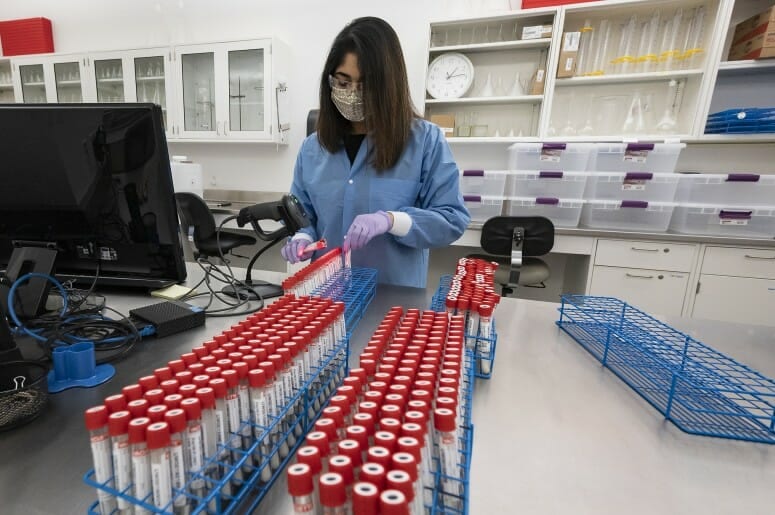
26 Mar Wisconsin Veterinary Diagnostic Lab serves on front lines of COVID testing and response

Junior biochemistry major Maria Phillip scans in COVID-19 nasal swab test samples at the Wisconsin Veterinary Diagnostic Lab. PHOTO: BRYCE RICHTER
Since August 24, 2020, the Wisconsin Veterinary Diagnostic Laboratory at the University of Wisconsin–Madison has performed nearly 200,000 COVID-19 tests on the UW–Madison campus. All the while, the lab has played a key role handling a COVID-19 outbreak among Wisconsin’s mink industry.
WVDL also hasn’t stopped its usual work conducting infectious disease testing for the food animal industry and for veterinarians, responding to viruses such as avian influenza and African swine fever, and helping detect and track chronic wasting disease. The lab was created in 1999, although UW–Madison has provided animal disease diagnostic help to veterinarians and producers in the state since the 1930s.
“We’re a public health tool,” says Keith Poulsen, who has served as WVDL director since 2019 and is also a faculty member at the UW–Madison School of Veterinary Medicine. “Every day, we work with the state hygiene lab, the state Department of Health Services, and Public Health Madison and Dane County.”
When the opportunity arose last spring to develop a reliable COVID-19 testing program for campus, Poulsen and his team rolled up their sleeves and got to work.
To pull this off, WVDL partnered with the Wisconsin State Laboratory of Hygiene and worked with state and local authorities to meet regulatory requirements and develop a COVID-19 diagnostic testing process. They had to make test kits and media, hire and train new staff, purchase or borrow specialized equipment, and scale-up quickly to be able to meet campus testing needs by the fall semester.
The lab now processes between 9,000 and 11,000 diagnostic PCR tests per week, often exceeding more than 2,000 tests per day.



